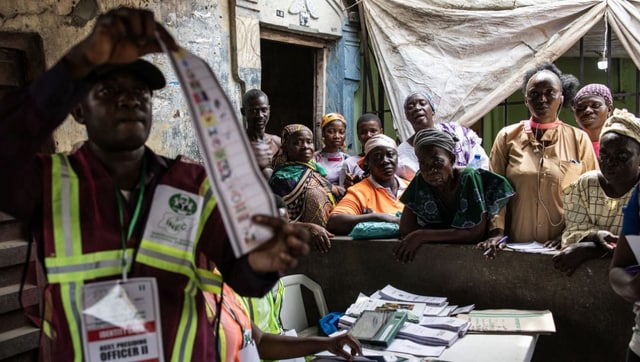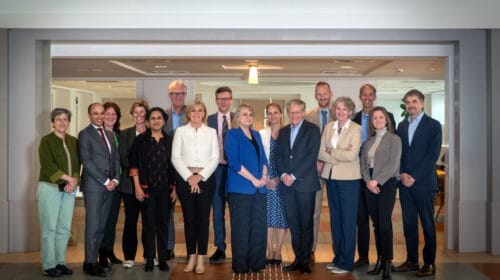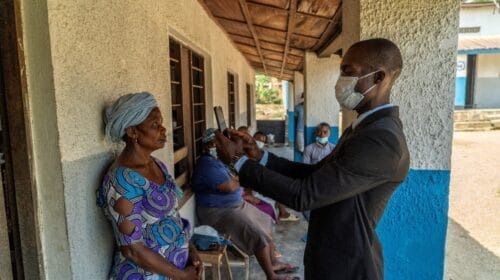Nigeria Presidential Elections 2023: Technical issues in counting of votes delay results

Representational Image. AFP
Abuja: Tens of millions of votes are being counted as election officials in Nigeria wait anxiously to see who will win the presidency and control of the national parliament in Africa’s most populous nation.
The result, however is expected to be declared some time in the middle of this week, reports claim.
Despite numerous delays and sporadic acts of violence, the voting on Saturday went off without a hitch.
Early expectations that official results for the entire country could be anticipated starting late on Sunday seem overly optimistic in light of the serious technical issues a newly implemented system by Nigeria’s Independent National Electoral Commission (INEC) has encountered.
Analysts refer to an election as a “bellwether,” one that could mark a significant turning point for Nigeria after years of escalating violence and severe economic difficulties.
Many believe that stability across a large portion of Africa depends on a credible poll and advancement in solving the nation’s numerous issues.
A 42-year-old vendor on Lagos’ Victoria Island named Dennis Olatunji expressed his concern that tensions may worsen if findings are released slowly. “Whoever they voted for, it’s going to be an issue for everyone.”
His worry was shared by others. “Let Nigeria decide O! @inecigeria,” the Nigerian Afrobeats musician winner Burna Boy wrote on Twitter. “No try any result magic.”
Only three of the 18 candidates vying to replace outgoing president Muhammadu Buhari are considered to have a legitimate chance of winning the election: Bola Tinubu, from the ruling All Progressives Congress; Atiku Abubakar, of the main opposition People’s Democratic party; and the Labour party’s Peter Obi, who is leading in some polls.
There are currently no accurate participation statistics, so observers’ opinions on it varied. Early predictions point to a high turnout, which would be anticipated to benefit Obi since young people, who make up about a third of the 87 million eligible voters, are known to vote.
Despite the fact that the race appears to be close, Nigerian election law prevents a runoff because the victor only needs a majority of votes if they receive 25% of the vote in at least two-thirds of the 36 states.
The numerous interruptions, delays, and technical issues with the new voting methods have drawn vehement criticism.
A coalition of civil society organisations called Yiaga Africa expressed worry over “voter suppression and irregularities.”
In a statement made at a press conference on Sunday, a coalition representative said, “It gets to the stage where we can no longer accept the excuses of INEC. We will be able to reveal any manipulation of the official findings if it occurs at any stage of the process,” he said.
Senior election authorities took action to allay worries. Reporters were assured that the outcomes of the elections were “safe” by Festus Okoye, national commissioner for communication and voter education for INEC.
Okoye stated on Sunday that “the commission is aware of challenges… and laments this setback.” These results are unchangeable, and any discrepancy between them and the physical results used for collation will be carefully examined and resolved.
What is causing the delay?
Nigeria is coping with a number of interconnected crises, such as economic instability, extremism, and widespread crime. A recent attempt to replace nearly all of Nigeria’s bank notes, made in part to curtail the pervasive practise of vote-buying, has greatly disrupted the economy and infuriated the populace.
Observers think that the lack of cash also affected turnout and made travel for poll workers and police officers much more difficult.
Analysts point out that some democratic institutions in Nigeria are strengthening and that this is the seventh election since the end of military control in 1999.
Another accomplishment is that none of the leading contenders are ex-military officials, a first for a Nigerian election. Another encouraging development has been Buhari’s, 80, determination to adhere to the two-term limit set forth in the constitution.
Although many Nigerians voice profound dissatisfaction with their government, they are frequently wary of any radical departure from the past.
Read all the Latest News, Trending News, Cricket News, Bollywood News,
India News and Entertainment News here. Follow us on Facebook, Twitter and Instagram.




